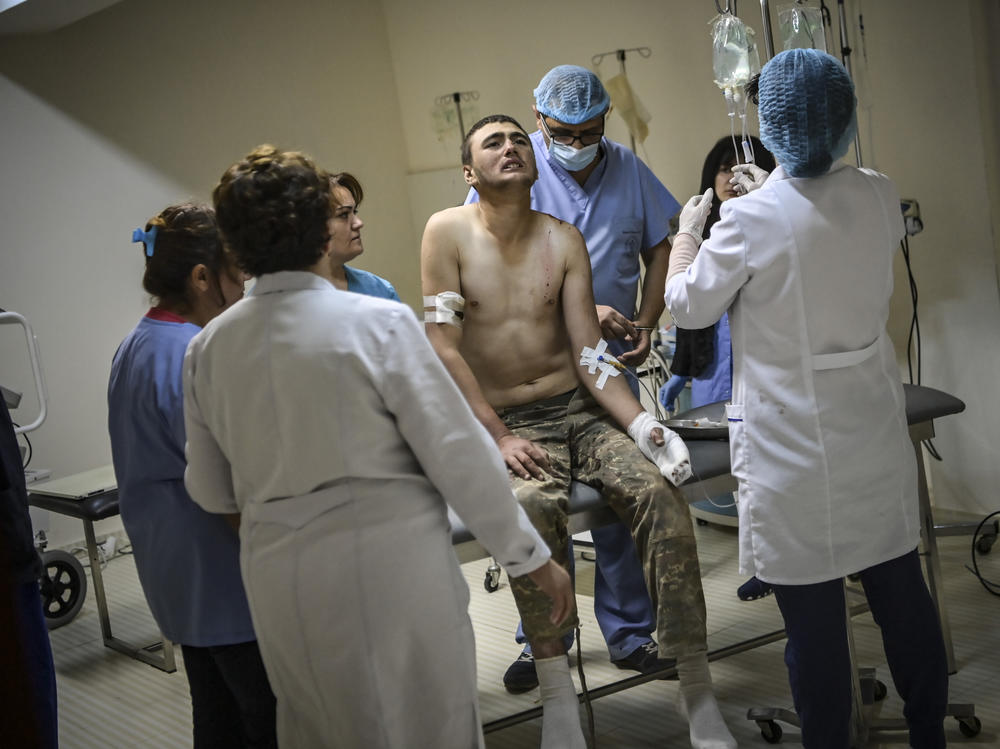Section Branding
Header Content
Azerbaijan, Armenia Trade Accusations Of Breaking Cease-Fire In Nagorno-Karabakh
Primary Content
Russia on Wednesday proposed sending military observers to monitor a shaky cease-fire in the disputed region of Nagorno-Karabakh, amid mutual recriminations between Armenia and Azerbaijan over alleged truce violations.
In the Azerbaijani capital of Baku, officials accused Armenia of trying to attack Azerbaijan's petroleum pipelines. In turn, Armenian officials said Azerbaijan was trying to seize Nagorno-Karabakh despite the cease-fire.
The tiny oil-rich region in the South Caucuses, which is internationally recognized as part of Azerbaijan, has been governed as a de facto independent state controlled by ethnic Armenians, known as the Republic of Artsakh, since it broke away in 1991.
The simmering conflict between the former Soviet republics over Nagorno-Karabakh erupted again into a hot war in recent weeks, with more than 500 killed since Sept. 27. It has quickly drawn in regional powers Turkey and Russia. Ankara has close ties with Azerbaijan, whose people are mainly ethnic Turkic. Russia is seen as an ally of Armenia, but also has a good relationship with Azerbaijan.
Azerbaijani President Ilham Aliyev has said he's confident of regaining the disputed region by force, a position that Turkey has backed, with President Recep Tayyip Erdogan pledging his nation's support and urging other countries to stand with Baku to "battle against invasion and cruelty."
Aliyev on Wednesday warned Armenia against any attempt to seize its oil and gas pipelines, two of which pass close to the disputed region.
"Armenia is trying to attack and take control of our pipelines," he said in an interview. "If Armenia tries to take control of the pipelines there, I can say that the outcome will be severe for them."
Armenia has denied the claim.
Nagorno-Karabakh's Artsakh Defense Army accused Azerbaijan of "targeting peaceful settlements," shelling the city of Martakert and conducting airstrikes in the region.
The foreign ministers of Azerbaijan and Armenia reached a deal for a humanitarian cease-fire starting Saturday and an exchange of prisoners, but the truce began to fall apart almost immediately.
Russian Foreign Minister Sergey Lavrov on Wednesday said he believed that Moscow ought to dispatch its own observers to monitor compliance with the cease-fire deal.
He said the decision was up to Azerbaijan and Armenia, but: "We believe it would be absolutely correct if they were our [Russian] military observers," Lavrov told Russian radio stations in an interview, according to the TASS news agency.
Meanwhile, Turkey has reportedly recruited Syrian mercenaries to join the battle on the Azerbaijani side, which Turkey denies, sparking concerns of a possible proxy war in the region. Militarily, Azerbaijan is seen as having the upper hand and Baku has reportedly gone on a weapons buying spree, purchasing tens of millions of dollars worth of arms in the lead-up to the fighting, Reuters reports, citing Turkish export data.
"It is not too late to resolve the conflict peacefully, through negotiations," Nagorno-Karabakh leader Arayik Harutyunyan said, Reuters reports. "But if the enemy doesn't want to, we are ready to fight to the end."
Armenian Prime Minister Nikol Pashinyan said Azerbaijan and Turkey were pushing the conflict and appeared to have no intention to honor the cease-fire.
In his interview with Russian radio, Lavrov said Moscow did not agree with Turkey that a military solution is a viable option, a position he said that was shared by Azerbaijan's leader.
"It is not a secret that we cannot agree with a statement that a military solution to the conflict is permissible," the Russian foreign minister said.
Since 1992, the Organization for Security and Co-operation in Europe's (OSCE) Minsk Group, co-chaired by Russia, the United States and France, have been working toward resolving the long-simmering conflict in the South Caucuses.
Late last month, French President Emmanuel Macron appeared to side with Armenia in the conflict, claiming that it was Azerbaijan that started the conflict and saying he had discussed the situation with Aliyev and Pashinyan.
"I wanted these attacks to end. I explicitly condemned these disproportionate attacks," he said in a news conference during a visit to Latvia.
Macron said it had been determined that the attacks "came from Azerbaijan," adding that: "Both sides must comply with the cease-fire."
However, on Tuesday, French Foreign Minister Jean-Yves Le Drian said France should remain neutral in the dispute.
"We would be doing a disservice to the quality of our bilateral relationship with Armenia if we took an unbalanced posture that would call into question the role we play in the framework of the Minsk Group and the influence we have," Le Drian told the French newspaper Le Figaro.
Earlier this month, the U.S. signed on to a joint statement with Russia and France condemning both sides for "the unprecedented and dangerous escalation of violence in and outside of the Nagorno-Karabakh zone."
Copyright 2020 NPR. To see more, visit https://www.npr.org.

